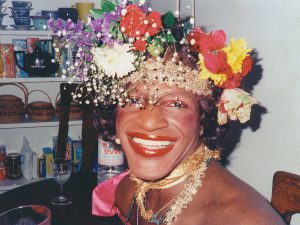Marsha P. Johnson was an African American transgender woman who was an LGBTQ rights activist and an outspoken advocate for trans people of color. Johnson lead the Stonewall uprising in 1969 and along with Sylvia Rivera, she later established the Street Transvestite (now Transgender) Action Revolutionaries (STAR), a group committed to helping homeless transgender youth in New York City.
Marsha P. Johnson was born Malcolm Michaels, Jr. on 24 August 1945 in Elizabeth, New Jersey. Johnson experienced a difficult childhood as she grew up in a very Christian household. She engaged in cross-dressing at an early age but was quickly reprimanded. Johnson moved to Greenwich Village in New York City after graduating from high school. In New York, Marsha struggled to make enough money to survive. She was homeless and prostituted herself to afford basic necessities. However, she found joy as a drag queen amidst the nightlife of Christopher Street. Johnson often thrifted and designed all of her own costumes. She quickly became a prominent fixture in the LGBTQ community serving as a “drag mother” by helping homeless and struggling LGBTQ youth whilst touring the world as a successful drag queen with the Hot Peaches.
An unconventional woman known for her outlandish hats and glamorous jewelry, she was bold and fearless. Despite her difficulties with numerous police encounters and mental illness, whenever she was asked what the “P” in her name stood for and when people pried about her gender or sexuality, she answered with “pay it no mind.” Her forthright nature and enduring strength led her to speak out against injustices.
On 28 June 1969, at the Stonewall Inn on Christopher Street, the hub of the NYC Gay Community in the 1960s, things turned violent. A few LGBTQ people were arrested on questionable charges, handcuffed, and very publicly forced into police cars on the streets of NYC. The LGBTQ community was fed up with being targeted by the police and seeing these public arrests incited rioting that spilled over into the neighboring streets and lasted several days. These events have been collectively described as a “riot,” a “rebellion,” a “protest,” and an “uprising.” Many eyewitnesses have identified Marsha as one of the main instigators of the uprising and thus, some have recognized her as the leader of the gay liberation movement in the United States.
As an African American trans woman, Johnson has consistently been overlooked both as a participant in the Stonewall uprising and more generally, LGBTQ activism. As the broader gay and lesbian movement shifted toward leadership from white cisgender men and women, trans people of color were swept to the outskirts of the movement. Despite this, following the events at Stonewall, Johnson and her friend Sylvia Rivera co-founded STAR where they became fixtures in the community, especially in their commitment to helping homeless transgender youth. STAR provided services including shelter, the first being a trailer truck, to homeless LGBTQ people in New York City, Chicago, California and England for a few years in the early 1970s but eventually stopped.
Sadly, at the young age of 46, on 6 July 1992, Johnson’s body was found in the Hudson River off the West Village Piers. The police ruled she had committed suicide despite claims from her friends and other members of the local community saying that she was not suicidal. As many members of the trans community had and still are killed for simply being who they are, it is speculated that Marsha was killed.
Marsha P Johnson can be seen as a hero and a leader, someone who was never afraid to stand up for her rights and the rights of others. Through her adversity, she still had the heart to help others in a similar situation and be an advocate for change in the LGBTQ+ community. Though her life was not a long one, she made a huge impact and created momentum in trans lives being seen and appreciated as equal.
